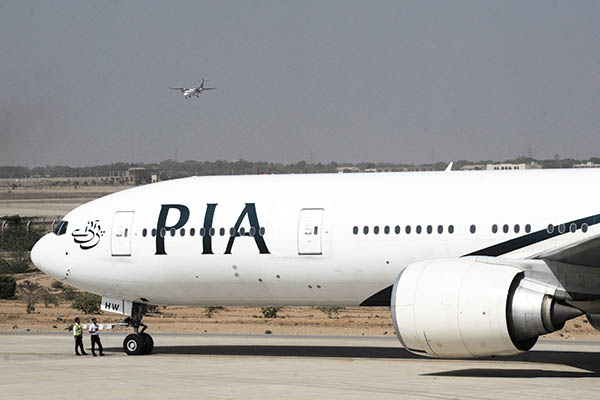
File photo. Asif Hassan—AFP
International Air Transport Association terms ‘dubious licenses’ a ‘serious lapse’ in safety oversight
The International Air Transport Association (IATA) on Thursday expressed concern over the “safety oversight” of Pakistan’s aviation regulator after national flag carrier Pakistan International Airlines (PIA) grounded 150 pilots for possessing “dubious licenses.”
“We are following reports from Pakistan regarding fake pilot licenses, which are concerning and represent a serious lapse in the licensing and safety oversight by the aviation regulator,” an IATA spokesman told journalists, adding that the organization was seeking more information before further comment.
On Thursday, PIA announced it was grounding 150 pilots who allegedly possess “dubious licenses,” and requested the Civil Aviation Authority (CAA) to provide a list of all pilots it believed had suspicious commercial pilot licenses. The controversy went global after Aviation Minister Ghulam Sarwar Khan claimed in Parliament that around a third of civilian pilots in Pakistan had fake or “dubious” licenses. According to the minister, some of these pilots had not sat for final exams themselves, while others had fake degrees that prevented them from qualifying as pilots.
According to a PIA spokesman, the airline has yet to receive the list of dubious pilots from the CAA, but has started grounding pilots of its own accord until a probe either clears or verifies the allegations against them. In a statement issued on Tuesday, the airline said “safety [of passengers] is more important than any commercial interest.”
The news has made headlines globally, with CNN, the New York Times and various news agencies raising questions about the safety of Pakistan’s civilian airlines in light of Sarwar’s revelations. The bulk of the criticism has been directed at PIA. In a posting on Twitter seeking to clear its name—but only making the situation murkier—the state flag carrier said: “Dubious pilots’ licenses do not pertain to PIA alone. Let it be on record, these licenses were issued by the competent authority and are valid as per their records. It’s the process and discrepancies through which they were obtained, triggered the inquiry by Government of Pakistan and action,” it said. The competent authority it refers to is the CAA.
A spokesperson for the Pakistan Airline Pilots Association (PALPA), told daily Dawn that the aviation minister’s claim had put the credibility of both PIA and CAA at stake. “Comments in international media regarding PIA having fake license holder pilots are not only shameful for the airline but for the country as well,” he said, adding that the fact that the CAA had yet to provide a list of the allegedly “dubious” pilots was proof the narrative was baseless, and was just damaging the state flag carrier’s global credibility.
The sole issuing authority for a pilot’s license, he said, was the CAA and no other organization could affect this process. All pilot licenses must be renewed every six months, he added.
Separately, Chief Justice Gulzar Ahmed summoned the chief executive officer of PIA, as well as the relevant officials of the CAA, in two weeks to provide clarification on the issue of “dubious licenses.” Hearing a suo motu case into the country’s coronavirus response, he said it was the CAA that issued such licenses and also summoned the director general of CAA to appear before the court and explain how the authority was issuing licenses to pilots.
